

Around two-fifths of all insurtech companies are based in the US, making it the world’s top insurtech hotbed. The robust number of startups and unicorns in the country indicates a thriving insurtech space that plays an essential role in the insurance industry’s transformation.
In this article, Insurance Business lists the largest insurtech companies in the nation based on market valuation. If you’re an investor looking for financially stable investments or an insurance professional in search of the sector’s leading “enablers,” you’ve come to the right place. Read on and learn more about the biggest insurtech players in the US in this guide.
To come up with the list, Insurance Business looked at publicly available business information and financial data. We then ranked the firms based on market valuation. Here are the 15 largest insurtech companies in the US based on our research.

Specialty: Health insurance
Market valuation: $11.2 billion
Total funding: $1.6 billion
CEO: G. Mike Mikan
Headquarters: Minneapolis, Minnesota
Bright Health Group is a diversified consumer-focused health insurtech firm offering a range of benefits and services to individuals, families, and care providers. It operates two businesses:
Backed by investment giant Tiger Global, Bright Health provides affordable health insurance in 99 markets across 14 states. In June 2021, the group raised $924 million in its initial public offering – a record at that time – pushing its valuation to over $11 billion.
Its CEO G. Mike Mikan was among the highest-paid insurance executives in that year, although his earnings made a sizable dip in 2022.

Specialty: Health insurance
Market valuation: $7.7 billion
Total funding: $1.6 billion
CEO: Mark Bertolini
Headquarters: New York, New York
Oscar Health’s goal is to redesign health insurance by taking a customer-centric approach. It utilizes big data to build proactive models to optimize the patient-doctor relationship and provide suitable health plans. The insurtech firm offers affordable health insurance to individuals, families, and small businesses.
In 2020, Oscar Health launched its virtual primary care service. The following year, the firm released its tech-driven platform +Oscar, a medical cost management platform that clients can access. The company serves more than a million members in 20 states.
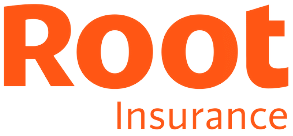
Specialty: Car insurance
Market valuation: $6.7 billion
Total funding: $827.5 million
CEO: Alex Timm
Headquarters: Columbus, Ohio
Root Insurance operates as an entirely digital car insurer, the first of its kind in the country. The insurtech company runs on the principle that car insurance rates should be based on driving behavior and not demographics. According to its website, the firm offers “fair and personalized rates” to good drivers. Its products are available in 34 states.
To date, Root Insurance has registered over 12 million downloads and collected around 20 billion miles of telematics data to improve its pricing models. The platform enables users to get coverage in under a minute, as well as manage their policies and file a claim.

Specialty: Cyber insurance
Market valuation: $5.0 billion
Total funding: $770 million
CEO: Joshua Motta
Headquarters: San Francisco, California
Apart from cyber insurance, Coalition offers a range of cybersecurity services, including digital forensics and incident response. It is licensed to operate in all 50 states and serves more than 160,000 clients worldwide. Its website describes the company as “the world's first active insurance provider,” helping customers avert cybersecurity risks before they strike.
Coalition reached a valuation of $5 billion in July 2022 after securing a $250 million financing. The company later acquired the P&C insurer Digital Affect from reinsurance giant Munich Re, strengthening its position in the market.

Specialty: Small business insurance
Market valuation: $4.0 billion
Total funding: $1.1 billion
CEO: Guy Goldstein
Headquarters: Palo Alto, California
Next Insurance has partnered with retail giant Amazon through Business Prime to provide small enterprises with an online platform to access different types of business insurance policies. The firm caters to enterprises in various industries, including construction, entertainment, fitness, beauty, and cleaning services.
The insurtech company has raised $881 million in six funding rounds. The last was from a Series E financing in April 2021, raising its valuation to $4 billion.
Next Insurance later purchased Juniper Labs as part of its plan to launch Next Labs. The platform uses Juniper’s open data and machine learning-powered underwriting tools to help the insurer deliver more scalable products.
In October 2021, the insurtech firm also acquired digital insurance agency AP Intego. This enabled the company to release Next Connect, an embedded insurance product for SMBs.

Specialty: Health insurance
Market valuation: $3.2 billion
Total funding: $419.4 million
CEO: Florian Otto
Headquarters: New York, New York
Cedar is a fintech company that uses big data to customize and streamline the medical payment experience. The firm’s mission is to provide patients with a “consumer-friendly” way to plan and pay their bills. Cedar serves more than 300,000 patients across 36 health systems daily.
In May 2021, the insurtech company announced its entry into the insurance market with the acquisition of insurtech start-up OODA Health. The move was fueled by a $200 million Series D funding earlier that year that pushed up the firm’s valuation to $3.2 billion. To date, Cedar has raised over $419 million in investments.

Specialty: Life insurance
Market valuation: $2.7 billion
Total funding: $414 million
CEO: Peter Colis
Headquarters: Palo Alto, California
Ethos Life offers ethical life insurance. The company’s goal, according to its website, is to “make life insurance more affordable, accessible, and transparent to as many Americans as possible.”
One of the top insurtech companies in terms of valuation, Ethos Life uses data science and deep tech to eliminate traditional barriers when purchasing life insurance. Applicants aren’t required to undergo medical exams. Instead, the firm relies on more than 300,000 data points and predictive analytics to determine risk factors. This process enables the company to manage applications digitally and offer tailored policies with same-day approval.
Ethos Life secured a $200 million investment funding in May 2021, putting its market value at $2 billion. Two months later, it picked up another $100 million, upping its valuation to $2.7 billion.
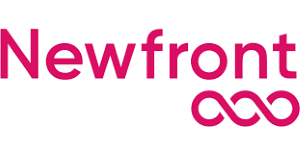
Specialty: Commercial insurance
Market valuation: $2.2 billion
Total funding: $310 million
CEO: Spike Lipkin
Headquarters: San Francisco, California
Newfront operates as a digital commercial insurance brokerage firm. Its platform allows users to streamline the traditionally tedious process of purchasing policies. The insurtech company also offers customized risk management plans and commercial policies across a range of industries.
In October 2020, Newfront raised $68 million in Series C funding. The following year, it announced its merger with ADB Insurance. This allows the combined entity to place more than $2 billion worth of premiums each year.

Specialty: P&C insurance
Market valuation: $2.1 billion
Total funding: $631.5 million
CEO: Daniel Schreiber, Shai Wininger
Headquarters: New York, New York
Lemonade uses AI and behavioral economics to offer homeowners, renters, pet health, term life, and auto insurance policies. All processes are done through its online app, including quoting, underwriting, payments, and claims handling.
In 2017, the insurtech company announced that it has set a world record by paying out a claim in three seconds. The firm achieved this by using chatbots and its anti-fraud algorithm to ensure that the claim was valid.
Lemonade is also a Certified B Corporation. It runs a yearly give-back program, where it donates unused premiums to non-profits selected by its community. This is one of the reasons why Lemonade is considered among the best insurance companies to work for in the US.

Specialty: Health insurance
Market valuation: $1.5 billion
Total funding: $719 million
CEO: Ali Diab
Headquarters: San Francisco, California
Collective Health provides self-insured employers access to a cloud-based integrated health benefits platform that allows them to manage healthcare plans. The company’s easy-to-navigate platform features dashboards that display data on an employer’s program performance, claims tools, and payments. It also gives businesses access to member advocates who can help employees find the care they need.
Collective Health’s membership has grown to more than 300,000 across all 50 states. Its clients include:
Collective Health raised $280 million in Series F funding in May 2021, raising its market value to $1.5 billion.
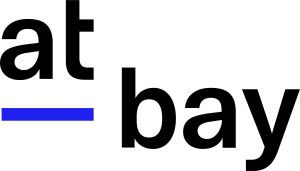
Specialty: Cyber insurance
Market valuation: $1.35 billion
Total funding: $297.5 million
CEO: Rotem Iram
Headquarters: San Francisco, California
At-Bay offers cyber insurance and a risk management platform where businesses can access a range of policies and cybersecurity insights based on their IT systems and vulnerabilities. The insurtech company provides coverage for:
At-Bay announced the closing of a $20 million extension to the company’s Series D financing in October 2021. This brought the round’s total to $205 million, placing At-Bay’s market valuation at $1.35 billion.

Specialty: Compliance
Market valuation: $1.2 billion
Total funding: $161.1 million
CEO: Niji Sabharwal
Headquarters: Denver, Colorado
AgentSync offers a “modern insurance infrastructure” that provides insurance carriers, agencies, and MGAs with tools for producer and compliance management. The company’s platform streamlines broker onboarding, contracting, licensing, and compliance.
AgentSync holds partnerships with some of the insurance industry’s biggest players, including:
The company has been recognized as one of the best places to work in Denver.

Specialty: Home & auto insurance
Market valuation: $1.05 billion
Total funding: $229.5 million
CEO: Steve Lekas
Headquarters: Columbus, Ohio
Branch Insurance is an insurtech agency offering home, auto, and umbrella insurance policies through its reciprocal insurance marketplace, called the Branch Insurance Exchange. A reciprocal insurance exchange is owned entirely by its policyholders but managed by insurance professionals.
Branch Insurance’s policies are available in 37 states. But in some states where it doesn’t currently operate, the company acts as an agent for P&C insurers Everspan and General Security National.
In June 2022, a $147 million Series C funding helped the insurtech company achieve unicorn status, raising its market value to $1.05 billion.

Specialty: Health insurance
Market valuation: $1.0 billion
Total funding: $163 million
CEO: Patrick Quigley
Headquarters: El Segundo, California
Insurtech company Sidecar Health enables members to access affordable health coverage by eliminating traditional process and transparency barriers. It implements a “cash-for-care” model that allows members to save an average of 40% on medical and healthcare costs compared to standard insurance.
Through the company’s mobile app, users can look up the cost of services. This gives clients an idea of how much they need to pay for a service, so they can shop around for a doctor that fits their budget. Sidecar Health is available in 18 states.
.png)
Specialty: Car insurance
Market valuation: $1.0 billion
Total funding: $304.5 million
CEO: Kyle Nakatsuji
Headquarters: Chicago, Illinois
Clearcover provides motorists with an online car insurance platform to shop around, compare, purchase, and manage policies. Advice and recommendations are delivered through the app’s Coverage Wizard feature, while claims are handled digitally via Clear Claims.
These features enable users to submit details and evidence of damage through their mobile devices to facilitate assessment and decision. Clearcover says the fastest it has paid for a claim is seven minutes.
In January 2020, Clearcover secured a $50 million Series C funding, allowing it to expand to new states. In April 2021, the insurtech company raised a further $200 million as part of a late-stage financing round. This pushed the firm to unicorn status.
Insurtech is an industry term used to describe a company that uses technological innovation to make the traditional insurance model more efficient. This includes using artificial intelligence and data analytics to offer fair and accurate premiums and make underwriting and claims processing faster.
There are generally two types of insurtech companies based on the role they play in the insurance industry:
Insurtech firms also come in different categories, regardless of whether they are enablers or disruptors. These include:
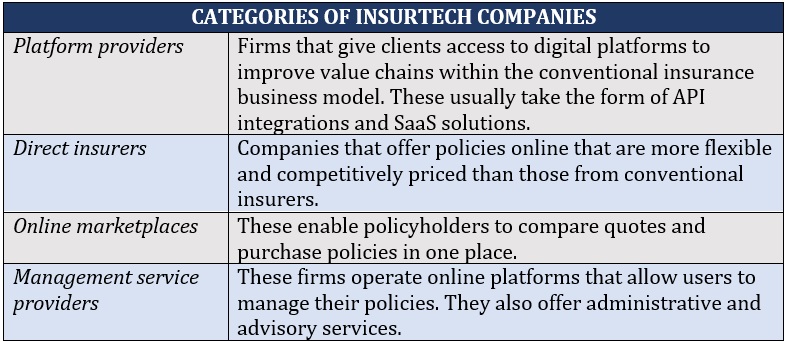
An insurance company provides products and services that protect policyholders financially against various risks. Both traditional insurers and insurtech companies fall into this category.
Traditional insurance companies, however, have been in the industry longer and operate established systems that insurtech firms are currently challenging to make the process more efficient.
Here are some of the key differences between a conventional insurer and an insurtech firm.
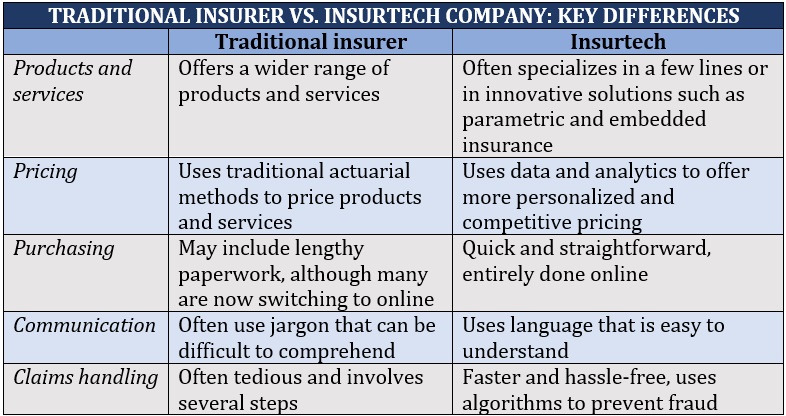
Our Best in Insurance Special Reports page is the place to go if you want to find insurtech companies that offer the best products and services. The firms featured in our special reports have been handpicked by their peers and vetted by our panel of experts as respectable and dependable market leaders.
Recently, Insurance Business unveiled 20 firms that made our list of five-star awardees for the Top Insurtech Companies in the US. These companies add value in these key areas:
By partnering with one of these insurtech companies, you’re going with a firm that can help transform your business.
Do you have experience with working with the insurtech companies on our list? How was it? We’d like to see your story in the comments section below.
